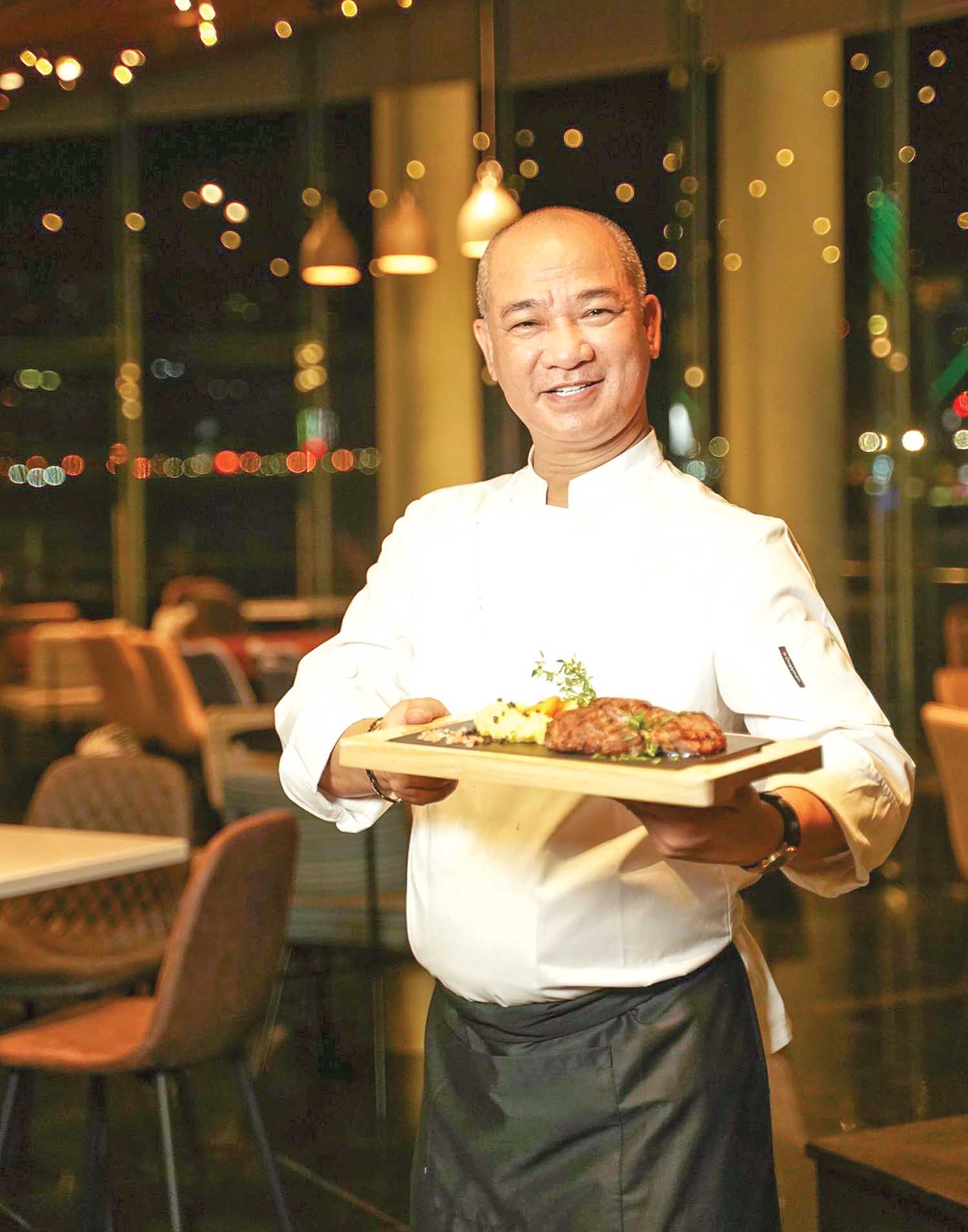Businessman Pham Tuan Hai: Converging regional characteristics to spread Vietnamese cuisine to the world
Pham Tuan Hai's reputation does not stop at being a "super chef", but he is also known as the founder and operator of Hi Chef Company; Chairman of Family Sauce Vietnam Food Company Limited, with 2 exclusively registered sauce products; owner of Com Xua restaurant in Saigon and Master Chef in Hanoi .
 |
| Entrepreneur Pham Tuan Hai, founder and operator of Hi Chef. |
Pursuing a career in cooking because of nostalgia for "old flavors and aromas"
Deciding to leave the wide-open promotion opportunities that many people “cannot even dream of”, in 1995, Pham Tuan Hai “moved to the South” with the determination to “become famous as a chef - succeed in his own way and succeed with his own ability”. From a person who “had nothing but conditions”, Hai accepted to stand stir-frying noodles on the side of the Saigon street, then stayed in a room right next to a pig roaster with a strong smell of charcoal and grease. “Will and aspiration will create a strong motivation to help people overcome everything”, Chef Pham Tuan Hai confided.
Ingrained in Hai's memory are the memories of his childhood with his family, with his kind-hearted grandmother, full of love, sympathetic to the unfortunate lives. Every noon, his grandmother's stall selling corn, potatoes, and cassava on a busy street in Hanoi was bustling with beggars waiting for her to finish selling, waiting for her to give them the neatly cut ends of potatoes and cassava, carefully wrapped and handed to each person... Hai vaguely felt the meaning of the saying "A piece when hungry is worth a package when full", in the immature soul of the 6-year-old boy there were strong vibrations of the warmth of human love.
Then, not sure since when, Hai became “addicted” to the smell of sweet potatoes and cassava “burning” the pot. By the glowing charcoal stove, his grandmother told Hai about “sweet potatoes, golden cassava”, and how to boil them, how to listen to the sound of water in the pot to know if the sweet potatoes and cassava were “burned” enough so that the sweet aroma stuck to the bottom of the pot without burning, to spread in the space an indescribable aroma – the aroma that Hai carried with him in his life’s luggage.
During the time living with her grandmother on the shore of West Lake, Hai also kept many memorable memories. Lang Ho is the familiar name of the people around the area who make a living thanks to West Lake. Her grandmother's snail noodle shop was as crowded as her grandmother's boiled sweet potato and cassava stall, and here, Hai witnessed a scene "exactly" like the old town: around noon, when she was preparing to set up shop, many people were holding bowls waiting for her to scoop a little snail soup for each person and pour some noodles on top. Her grandmother also made rice cakes to sell. Hai noticed that every night after grinding the flour, before going to bed, she always stirred the lime water to let the lime settle, then skimmed the scum on the surface of the water, to make the water as clear as possible. Hai saw the meticulousness and elaborateness in each of her movements.
At that time, most parents did not have any career guidance for their children and Hai was no exception. “I must do something useful”, the 7-year-old boy whispered to himself as a way to share his parents’ busyness with making a living and the hardships of his two grandmothers.
Hai was good at natural sciences, especially Chemistry. In the 90s of the 20th century and many years after, Hanoi Medical University was always at the top of prestigious universities. Following the "hot trend" of "first Medicine, second Pharmacy" at that time, Hai took the exam and passed the Hanoi Medical University. However, the closer the admission date was, the stronger the ideological conflicts in Hai became, on one side was the satisfaction of having affirmed himself through the fierce exam, on the other side was the urge of nostalgia from a not-so-distant past. Finally, Hai decided to study cooking.
The arduous task of finding a solution to the culinary "problem"
In 1990, the Hotel and Restaurant Staff Training School was located in Buoi village, close to Hai's Ho village. When he started studying, he "realized" that the rustic gifts of his grandmothers and maternal grandmothers were deeply embedded in the culture throughout history. He also soon realized that the development of society would be an inevitable trend, from "full food, warm clothes" would quickly change to "delicious food, beautiful clothes".
At that time, all students focused on their major of cooking, but Hai had already shaped his own path.
“Culinary arts will develop in three forms: first is culinary artists, who are those who study cooking to practice cooking; second is culinary business, who may not know anything about cuisine, but have money to invest in restaurants; third is culinary management, who must have knowledge of cooking and understand the principles of business. To develop culinary arts, if it is simply a cook, it will certainly not solve the problem,” Chef Hai shared.
After graduating, Hai was accepted into the kitchen department of Huong Duong Hotel (a luxury hotel in Hanoi at that time), and was quickly promoted to Head Chef. The income was very good, the opportunity for advancement was wide open, but Hai realized that the limitation in serving customers was that there was almost no creativity or innovation in culinary development for a long time. This "inherent characteristic" was of course not suitable for Hai's curious personality.
“To make delicious food, you need to have a variety of ingredients and access many different cuisines and styles. So there is no other way but to learn and grasp it yourself,” he said.
Hai quit his job, despite all advice. He packed his backpack and headed south to “seek a teacher and learn from him”.
The splendid Saigon was completely unfamiliar to the young man from Hanoi. The culinary styles of the two regions were also very different. The first time he saw a bottle of oyster sauce or sesame oil, Hai did not know what it was. He asked for a job as a chef stir-frying noodles at a roadside restaurant. Three months of sunshine and rain, without a single day off, helped Hai understand the characteristics of Southern cuisine. He was accepted into the kitchen of a luxury hotel and within just over a year was appointed to the position of Assistant Chef. During this time, Hai also took the entrance exam to the Open University, Faculty of Business Administration. This was the time when he constantly changed workplaces, because of his "desire to learn about different culinary schools".
From a Demi Chef (shift leader) to a regular chef, accepting a much lower salary, but the much bigger "gain" is understanding the rules of changing the menu according to the time; or how to bring in international "super chefs" for each event; and how to operate many departments to achieve the most harmony and coordination.
In 2006, Hai received his diploma while holding the position of Head Chef at a large Swiss corporation, then was recruited by Unilever to work as a culinary solution consultant for restaurants and hotels. For 10 consecutive years, he worked with Unilever as a culinary expert.
Now, Pham Tuan Hai's reputation does not stop at being a "super chef", but he is also known as a sauce producer with 2 exclusively registered sauce products; along with operating the Com Xua restaurant in Saigon, Master Chef in Hanoi, Chef Hai is striving to elevate regional cuisine to become a mainstream product.
Many people say that you have a “magic” hand, able to turn ordinary dishes into specialties. What do you think about this?
My culinary philosophy is to elevate the product, to turn rustic dishes into high-end dishes. Up to now, the concepts for large corporations and hotels have been like that.
Since I was in culinary school, I have shaped the story of culinary management. A dish must have a story of the product, in which locality it is associated with that region. Why is the grass carp of Son River (Quang Binh) delicious, different from grass carp in other places? Why is Cao Lau only in Hoi An, Quang Nam? The problem is to "push" it into a brand.
Elevating local cuisine requires combining many things, having full knowledge, understanding the characteristics of the combined ingredients, and not doing it haphazardly. And the most important thing is to get it from that region, not from somewhere else. The cactus is thorny, but it is still processed into pickles or cooked with fish, then cassava stir-fried with butter and garlic (Asian - European fusion) which is very attractive to diners...
He used to hold high positions in large corporations, hotels, and high-end restaurants, but then he gave it all up to become a chef. Is this proof of his “full passion for cuisine”?
I like to do nothing but cook. My desire is to spread the quintessence of Vietnamese cuisine to the world. Cuisine is an important element in tourism development.
The invention of a pure Vietnamese sauce is not only for Vietnamese people, but also for those who love Vietnamese cuisine around the world to be able to prepare their favorite dishes. This is also a way to spread the value of Vietnamese cuisine globally.
In your opinion, can we develop cuisine into a unique Vietnamese brand to stimulate tourism?
Absolutely. Someone suggested that Vietnam should be the kitchen of the world. Although we have not implemented a specific action program, in almost every activity and event, cuisine is still the focus.
Vietnamese food is great, meeting the current world trend of health. The problem is to start from the core, all provinces and cities must find a way to make their dishes become specialties and promote them.
More than 20 years ago, how many people knew about Thai sauce? But when the Prime Minister of Thailand announced that Thailand would make the sauce a dish that everyone in the world knew, and the results were evident to everyone. So the problem is to have consensus and a consistent approach.
No matter how famous or talented a foreign chef is, it is difficult to elevate a country's cuisine because of its dispersion and fragmentation. If we converge and distill the culinary quintessence of 63 provinces and cities across the country, then surely, Vietnamese cuisine will affirm its position and class on the world map.
Source




















































![[Maritime News] More than 80% of global container shipping capacity is in the hands of MSC and major shipping alliances](https://vphoto.vietnam.vn/thumb/402x226/vietnam/resource/IMAGE/2025/7/16/6b4d586c984b4cbf8c5680352b9eaeb0)













































Comment (0)